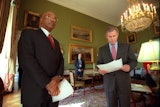 Dr. Eddie S. Glaude is chairman of the Department of African American Studies at Princeton University.
Dr. Eddie S. Glaude is chairman of the Department of African American Studies at Princeton University.Democracy in Black: How Race Still Enslaves the American Soul (Crown) by Dr. Eddie S. Glaude Jr. is an insightful text that examines how Black lives continue to be rendered insignificant in an era when many thought that the election of the nation’s first Black president would signify a dramatic shift in race relations.
A well-known professor at Princeton University who is chairman of the Department of African American Studies, Glaude opens the book detailing an encounter in Ferguson, Mo., between himself, a colleague and three women from Millennial Activists United—a grassroots organization that came into existence after 18-year-old Michael Brown was shot and killed by Ferguson police officer Darren Wilson.
“Something happened in Ferguson that transformed these young women and transfixed the nation,” writes Glaude. “As one of them said, ‘You just felt something different in the air.’ As if the fog was lifting a bit. I couldn’t help but think of the contrast. They came of age politically with President Barack Obama in office and now they bathed in the intense rage of Ferguson. In so many ways, these young people were unprecedented.”
Throughout much of the 288-page book, Glaude offers a sharp critique of Black and White political leadership that “sold black America the snake oil of hope and change” in the face of daunting circumstances.
Inequality and racial habits, he argues, are “part of the American Idea. They are not just a symptom of bad, racist people who fail to live up to pristine ideals. We are, in the end, what we do. And this is the society we have all made. So much so that we can have a black man in the White House and nearly one million black men and women in the Big House.”
Diverse recently caught up with Glaude—who we selected in 2008 as one of our Emerging Scholars—to talk about his new book, which is quickly becoming one of the most discussed texts both in and out of academic circles. Here is an excerpt of that conversation.
Q: What was the genesis of the book? I understand the timing, given that it examines the conditions before, during and after the Obama presidency, but how did it come about?
A: Ironically, it wasn’t a kind of assessment of the Obama years. It was really me trying to come to terms with all of this talk about economic recovery. I didn’t understand it, because when I looked around and I looked at the data, I saw devastation in Black communities. And I was just struck by people talking about recovery as I was witnessing Black folk losing their homes; witnessing Black folk entering a brutal rental market; not really finding their feet in the job market; and, if they were able to find jobs, they had to work longer and harder for less wages.
Then there’s that startling statistic of 38 percent of Black children in poverty. There are now more poor Black children than there are poor White children, and there are three times more White children in the country than Black children. It was that disconnect. What is it about our suffering? And so, I said, ‘We are disposable and we are invisible.’ And why are we disposable? Why are we invisible? Well, it’s the value gap.
The second motivation for the book actually had to do with all of these Black people grieving in public over the death of their children. Whether it’s Trayvon Martin or later Michael Brown … we can just go down the line. And I was trying to make sense of all that death. So, I needed to write a book that could give an account of the persistence of racial inequality that’s not reducible to big bad racists. In the process of giving that account, I wanted to tell a story about the collapse of Black politics and our failure to be able to respond in a robust way to that devastation. That’s the genesis of the book.
Q: Throughout the book, you continually make reference to this “value gap” concept. What is that?
A: We talk about the achievement gap and we talk about the wealth gap, but, as I say in the book, there is something more basic. In this country, White people are valued more than others. And to the extent to which that valuation is evident in our social arrangements and our political reality and our economic realities, no matter what the inputs are the outputs will be the same.
With advances that are meaningful and substantive that changes and expands the nature of democracy, those advances are contained and arrested by a reassertion of the value gap. So when Black people say, ‘Nothing has changed,’ they’re not saying that 2016 is the same as 1916 or 1816. What they are saying is that the value gap still obtains. I wanted to give the notion of White supremacy a different kind of inflection. It’s not simply about people holding bad views. The belief that White people are valued more than others is a belief that’s built into the environment. We’re socialized and habituated by the very spaces we live; where we work; where we’re educated.
Q: Interesting. And, yet, there was this sense by some that the election of Barack Obama would change things, right?
A: We hoped that Obama was going to be more, but he turned out to be like all of the other Democrats. A lot of hope was invested in Jimmy Carter coming out of [Richard] Nixon and [Gerald] Ford, and, halfway through his first term, Jesse Jackson called him a traitor because he turned his back on Black people. In some ways, Jimmy Carter was the first neo-liberal president.
So, in some ways, the book is trying to reconcile that paradox; that we had supposedly turned the corner. But the value gap and racial habits suggest that a symbolic change is significant, but not sufficient. There is a sense of pride in the singularity of Obama’s achievement and a sense of protection given the threat and the volume of disrespect. But at the same time, I do know that Black people are catching hell and they’ve been catching hell over the last eight years. And the only response has been: ‘Well, imagine, it could have been worse.’ And that’s not a satisfactory response.
Q: Your chapter on White fear is interesting. You point out that fear among White people is real.
A: Oh yeah. This is one of the startling features of the new economy as Barack Obama described it. And they [Whites] feel themselves losing ground and footing. Their wages have flatlined; their houses aren’t worth anything. Education is so expensive that it’s beyond their reach. They’re dying earlier, and so the logic of the new economy has in some ways taken the rug out from under their feet. And in these moments, it’s easy to scapegoat.
Q: You write about the lingering impact of the Great Recession of 2008 and its impact on Black people. That wasn’t that long ago.
A: Two hundred and forty thousand homes were lost in the Black community. I don’t think we’ve seen this kind of loss of wealth since the collapse of the Freedmen’s bank, in terms of its long-term implications. The challenge has been moving from the housing bubble and owning your own place into a brutal rental market where finding decent housing at a decent price is hard. And you’re not making enough money, so you have to choose between putting food on your table and keeping a roof over your head. We’re fond of saying, ‘When White America has a cold, Black America has a flu,’ but these communities still have not come out of it, despite all of this talk of recovery. We have not recovered.
Q: This book feels different from some of your other scholarly writing. Do you agree?
A: I’m trying to reach a broader audience, so it does not have the vibe and feel of the kind of narrow professional concerns that the other books have had. The writing is different. I’ve become much more comfortable as a writer, and I wanted to write a book that my Mama could finish. She called me and told me that she’s on chapter six. That’s as good as it gets. I think I’ve found my intellectual voice. It is mine. And it’s not filtered through my engagement with [John] Dewey or Cornel [West]. This is me, and it’s me with a level of comfort, confidence and courage that I can speak. It’s really about me coming of age and coming into my own as a public intellectual.
Q: What do you want readers to take away?
A: My critique of the Black political class is strident. Part of what I’m calling for is a much more vibrant Black political landscape where it’s not just an argument among Black liberals. I want us to see and understand that democracy is much more than voting; that voting is actually the last thing you’re supposed to be doing, not the only thing.
And underneath it all is my abiding faith in the idea of democracy, evident in the organizing work of Ms. Ella Baker and the Student Nonviolent Coordinating Committee and that is creating the conditions for everyday ordinary people to understand themselves as being the leaders they’re looking for and to understand that American democracy will never take fundamental shape as long as the value gap obtains.
So, we’ve got to close the value gap and uproot racial habits. And the only way we’re going to do that is to do democracy in Black. And that is that fundamental grassroots organizing and mobilizing where we challenge the very idea of who is the people. We are the leaders we are looking for, and we have to take care of business.
Jamal Eric Watson can be reached at jwatson1@diverseeducation.com. You can follow him on twitter @jamalericwatson















